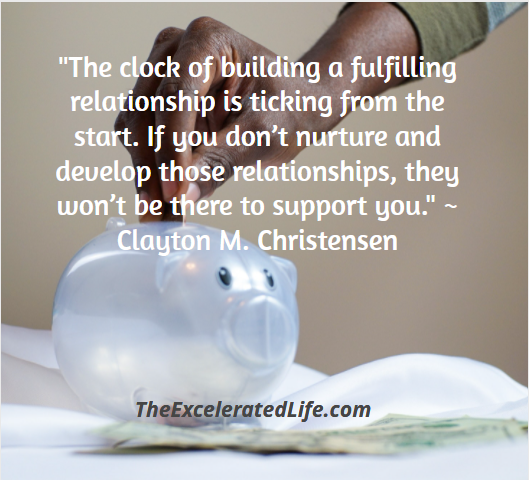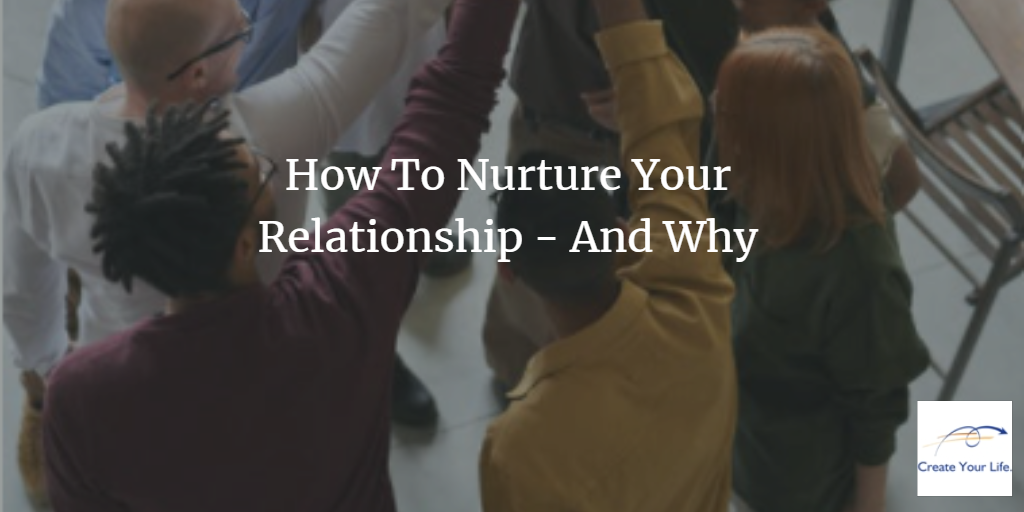Financial investing is important to your well-being and contributes to positivity levels up to a certain point. Just as important, perhaps more so, is to make investments into your relationships. In fact, having strong, healthy relationships is one of the pillars of well-being.
TheExceleratedLife.com
Title Photo by fauxels from Pexels

“Investing For Future Happiness”
“There’s a reason that the film It’s A Wonderful Life has been so resonant for decades: what matters most in the darkest hours of George Bailey’s life are the many personal relationships he has invested in along the way. He recognizes, by the end of the film, that though he is poor, his life is rich in friendships. We all want to feel like George Bailey – but that simply isn’t possible if we haven’t done the work of investing in those relationships with friends and family throughout our lives.” [Christensen]
In How Will You Measure Your Life, Clayton M. Christensen explores the necessity of nurturing our relationships. Just as we must carefully make financial investments, it is even more important to make investments in our relationships. These are “life investments”. [Christensen]
As Christensen reminds us, George Bailey’s wonderful life was not based on material wealth but on the richness of his relationships with his family and friends. As his brother Harry points out in the final scene, because George has nurtured his relationships, his big brother is “the richest man in town.”
Nurture Your Relationships Now
Recall Stephen Covey’s description of the “emotional bank account”. When we have a financial bank account, we make deposits into it on a regular basis. Many small deposits made into the account over time begin to add up and then, one day when you need to withdraw some money, it’s there available to you. [Covey]
The “emotional bank account” works in much the same way. In order to draw upon the resources of deep relationships, you must make your investments long before you need to draw from them. If you wait to start until you need them, it’s already too late. [Christensen]
For example, you cannot ignore your children when they are small, then expect to develop a relationship when they are teenagers. Or if you don’t keep up with friends till you need a lift home — who will you call?
Making Deposits
Of course, to make deposits into someone’s emotional bank account requires that you first know what a deposit is. A nurturing relationship is not solely about finding someone to make you happy but also finding someone you want to make happy. Like the two sides of a coin, you need both.
In fact, the act of discovering what constitutes a deposit for another and then doing that is, in itself, a means for strengthening the relationship. “In sacrificing for something worthwhile,” Clayton Christensen writes, “you deeply strengthen your commitment to it.” [Christensen]
But you need to be sure that you understand what the other person wants, to know what truly makes them happy, and NOT what you think will make them happy. What constitutes a deposit for one person may have no effect on another and might even be a withdrawal for someone else. However, here are three ideas to consider that are good candidates for making deposits.
Active-Constructive Responses
As we have discussed previously, we can respond to friends and loved ones in one of four different ways.
- Active and Constructive – enthusiastic support. You react enthusiastically.
- Passive and Constructive – quiet, understated support. You’re happy but generally unresponsive.
- Active and Destructive – demeaning the event. You respond by focusing on the negative aspects of the news.
- Passive and Destructive – ignoring the event. You are uninterested.
Only one of these – Active and Constructive response – is a deposit and (3) and (4) are actually withdrawals.
The problem for most of us is that active, constructive responses do not come naturally. So a little practice might be in order. Keep these points in mind.
Be sincere. You can respond actively and constructively without going overboard. Just be aware that interest and enthusiasm are part of the active, constructive response, so be enthusiastic and sincere.
If a full-blown active, constructive response is too hard for you at the outset, practice eliminating “but” from your response. When someone relates good news, respond to them without using the word “but”. This is a simple way to start yourself on the path to more productive responses.
Keep your eyes open for chances to practice your active and constructive responding. If you miss a chance, go back over the event in your mind and think of how you could have responded.
“How Can I Help?”
“‘How can I help?’ is an essential question. It is the question that forms the basis of all good relationships. It is a question that signals that you care. It signals a willingness to help. But it also signals respect, humility, and the likelihood that, in the end, it is you who will be helped just as much.” [Ryan]
When you ask this question of family members and loved ones, friends, or work colleagues, you’re not jumping in to try to give them a solution to their problem. Instead, you’re acknowledging that they are dealing with a problem, you’re opening up to listen and to be a sounding board, and you’re showing that you are available to help if they need you.
When you ask the question, you enter into a conversation. You are open to learning as well as teaching, in a reciprocal relationship. You’re not there to “fix” anything but to learn and offer suggestions if appropriate. [Ryan]
Asking “How can I help?” is “asking, with humility, for direction.” In fact, says Ryan, “in asking how you can help, sometimes you already have.” [Ryan]
Show Appreciation
So far, we’ve looked at a couple of activities that you and I can use to make deposits into another’s emotional bank account. How about the flip side, when someone makes a deposit into your account?
When the other person makes a deposit for you, show your gratitude and appreciation. This builds on the original deposit. Say “thank you” and tell them why it matters to you. Be specific.
Over time, it can be easy to take a loved one for granted. And unfortunately, this is especially likely for longer-term relationships. Showing appreciation is an important skill for nurturing relationships. [“10 Easy Habits”]
Small acts of appreciation pay large dividends. Say “thank you” for something the other person does that you usually don’t notice. Slip a note under his or her pillow. Complete a chore that they typically do. Write a letter to the other person, expressing your gratitude for their love and friendship and how much it means to you.
“Nothing kills a relationship faster than having one person feel like they are not appreciated or valued. Make it a habit to show appreciation every day.” [“10 Easy Habits”]
Take Action Today
If you don’t make deposits into your financial bank account, you’ll be in a bind when a financial emergency or need arises. It’s true for the emotional bank accounts of your relationships, too. If you don’t make small deposits regularly over time, there’s nothing to draw from when you hit a rocky patch.
Begin today to nurture your relationships with your family, your loved ones, your friends, and your work colleagues. Start by finding out what makes up a deposit for the important people in your life. Also, consider the activities we’ve just discussed.
How can you begin to give more active and constructive responses when a friend or loved one shares good news?
Remember to ask, “how can I help?” instead of jumping in with ideas and suggestions for solving another’s problems.
And show genuine appreciation for your spouse, your children, your friends, and everyone with whom you have some type of relationship. Be grateful that you have them in your life.
Nurture your relationships. Invest in them and watch them grow. That is embracing your Excelerated Life™!
Developing Excelerated Relationships™ — nurturing ties to other people — is one step in creating your Excelerated Life™, a life of flourishing and well-being, and a life of meaning, purpose, and service.
Read more about the Excelerated Life™.
Resources:
“10 Easy Habits That Will Nurture Your Relationship.” Wake Counseling & Mediation. Wake Counseling & Mediation, March 3, 2019. Web. January 17, 2021.
https://www.wakecounseling.com/therapy-blog/10-easy-habits-that-will-nurture-your-relationship
Christensen, Clayton M. How Will You Measure Your Life? New York: HarperCollins Publishers Inc., 2012.
Covey, Stephen R. The Seven Habits Of Highly Effective People. New York: Simon & Schuster, 1989.
Ryan, James E. Wait, What? And Life’s Other Essential Questions. New York: HarperCollins Publishers Inc., 2017.


